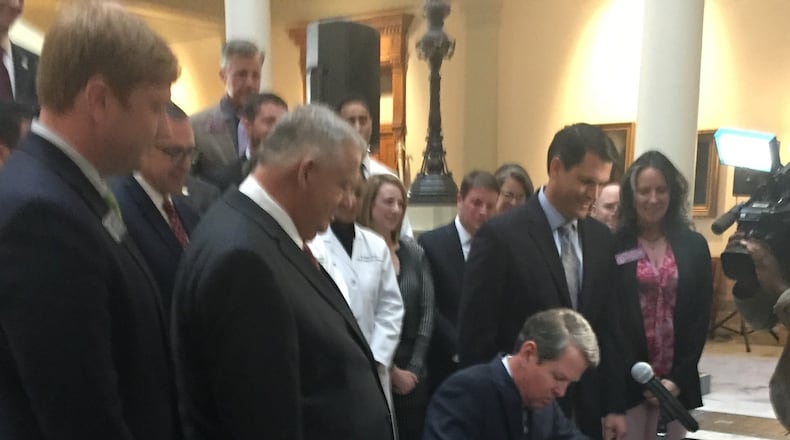Gov. Brian Kemp is set to unveil a proposal Thursday that he has said would create a "reinsurance" program to help stabilize volatile insurance costs on the individual market.
The program would require obtaining a waiver from the federal government, asking it to free the state from some standard rules in order to tailor a program officials here think would work best for Georgia.
The waiver idea became a staple of Kemp’s campaign in the final weeks before last year’s election, and it’s designed to create a fund that aims to lower premiums on the health insurance exchange market by possibly subsidizing private insurers’ coverage of high-risk customers.
The governor, who plans to detail the plan at a Thursday press conference, has said his idea would help private insurance companies on the state’s Affordable Care Act exchange market pay for the high cost of patients with pre-existing conditions.
His office would not speak publicly about the plan ahead of the announcement, but in the past Kemp has told The Atlanta Journal-Constitution he was exploring a “reinsurance” plan.
Kemp is also interested in a waiver involving the state’s Medicaid program.
The governor is expected to soon outline specifics of that more contentious waiver proposal, an idea that emerged after Kemp’s victory and raises the possibility of a partial expansion of the Medicaid program to some of Georgia’s poorest residents.
The federal government would have to approve both of the waivers before they can be implemented. The feds have signed off on waivers for reinsurance programs submitted by at least a dozen other states. Kemp has said he won’t be a “lone ranger” with the idea, though he’s promised it would be an innovative measure.
States have tried a range of ideas to stabilize and lower ACA exchange plan costs with “reinsurance” or “high-risk pools,” ideas where the state tries to remove some of the bigger financial risks to insurance companies for insuring those patients. One factor in such programs’ success appears to be whether the state funded them well enough to make a difference.
Georgia’s ACA exchange has finally stabilized on its own, with premiums basically flat this year and a couple new insurers joining the market. But those premiums for patients who don’t qualify for federal subsidies, patients in the middle- to high-income range, are astronomical.
Kemp has fiercely opposed a full Medicaid expansion, saying that adding more than 500,000 Georgians to the state’s rolls could be too costly in the long run. But pressure has built on Kemp since his narrow November victory to take more significant health care action in time for the 2020 election.
But his administration hired the Deloitte consultancy firm to devise several other options, including some that could allow a more limited expansion but also include conservative elements such as work requirements.
Democratic leaders say full-on expansion is the only way to spur the economy, cover hundreds of thousands of Georgians and help cash-strapped rural hospitals. They see anything short of that as a half-measure that will do little to address systemic problems.
AJC polls have consistently shown that more than 70% of Georgians support expanding Medicaid coverage for the poor. That now includes a slight majority of Republicans.
In the AJC’s latest poll, though, a majority of Georgians also supported a work requirement for some adults seeking government-subsidized health care coverage.
Lawmakers gave Kemp the power to pursue the waivers earlier this year by restoring authority that was stripped from Gov. Nathan Deal in 2014. It gives him a limited window to do so, and Kemp has set an aggressive time frame with a goal of winning federal approval in 2020.
That’s just in time for next year’s election, when Republicans will be pushing for a new way to respond to Democratic demands for a Medicaid expansion.
There’s no guarantee that Donald Trump’s administration will sign off on the plan despite Kemp’s ties to the president. But the governor’s advisers have expressed confidence that it will pass muster.
One reason is a recent shift in federal policy that aims to give states more flexibility in administering the Medicaid program. It's part of a strategy by the Trump administration to head off a push for full Medicaid expansion by approving more limited waiver programs.
Keep Reading
The Latest
Featured



